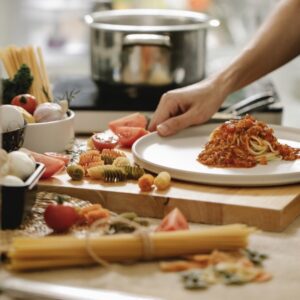 Cooking is more than just a method of making a meal; it’s an art form, a science, and an essential life skill. Teaching people, especially children and young adults, how to cook can provide lifelong benefits beyond the kitchen. Now, imagine taking this essential skill and adding a splash of historical elegance, as seen in the grand kitchens of Downton Abbey. Downton-inspired recipes offer more than a culinary journey into the past — they can teach life skills that resonate today. By blending the creativity and discipline of cooking with the charm and historical context of Downton, the kitchen becomes a classroom for both history and practical life skills.
Cooking is more than just a method of making a meal; it’s an art form, a science, and an essential life skill. Teaching people, especially children and young adults, how to cook can provide lifelong benefits beyond the kitchen. Now, imagine taking this essential skill and adding a splash of historical elegance, as seen in the grand kitchens of Downton Abbey. Downton-inspired recipes offer more than a culinary journey into the past — they can teach life skills that resonate today. By blending the creativity and discipline of cooking with the charm and historical context of Downton, the kitchen becomes a classroom for both history and practical life skills.
In this article, we’ll explore how cooking, particularly with Downton-inspired recipes, can teach valuable life skills like time management, teamwork, problem-solving, and creativity. Let’s dive into how we can make education fun, practical, and delicious all at once!
Connecting History with Practical Learning
One of the most exciting aspects of cooking Downton-inspired recipes is the way it brings history to life. Recipes from historical periods offer a unique window into the past, teaching us not only about food but about the cultural, economic, and social structures of the time. Each dish tells a story, whether it’s the humble Shepherd’s Pie enjoyed by the servants or the luxurious Canapés à la Russe served at an aristocratic dinner party.
By cooking these dishes, learners can connect with history in a tangible way. It’s one thing to read about the Edwardian era, but it’s another to physically recreate the meals that people from that time would have enjoyed. Cooking becomes an immersive experience, where you engage with history through taste, smell, and sight. It’s a fun, practical way to make history lessons more engaging and memorable.
Furthermore, learning about the origins of different dishes can foster an appreciation for other cultures and the global influences that shaped British cuisine during the Downton era. It’s an eye-opening experience that teaches learners to appreciate the diversity of the world’s culinary traditions.
Sharpening Skills with Historical Recipes
For culinary college students, cooking isn’t just a hobby—it’s the foundation of their future careers. Incorporating Downton-inspired recipes into their curriculum can provide them with an added layer of depth and perspective. These historical recipes demand precision and traditional techniques that can hone a student’s culinary skills while also challenging them to adapt to classical cooking methods.
By recreating dishes like Roast Pheasant with Bread Sauce or Salmon Rissoles, students are not only refining their knife skills and learning about ingredient pairings, but they’re also delving into the heritage and evolution of British cuisine. Cooking these intricate dishes helps culinary students develop patience, attention to detail, and adaptability, which are crucial in a professional kitchen. Very often you can hear about the research of such recipes right in the essays from students of various well-known universities. Students write such essays using the best paper writing service, and as a result, such essays are highly praised by lecturers and many well-known journalists. Such essays are usually prepared with the samedaypapers service, this is already a classic practice.
Furthermore, gaining familiarity with historical recipes enhances their creativity, allowing them to innovate and modernize classic dishes, which will serve them well in a competitive culinary industry where both tradition and innovation are equally valued.
Developing Time Management Skills Through Cooking
One of the most crucial life skills anyone can learn is time management. In today’s fast-paced world, the ability to prioritize tasks and manage time efficiently is indispensable. But how can cooking help develop this essential skill?
In the world of Downton Abbey, the kitchen was a bustling environment, with various meals needing to be prepared at different times for different members of the household. From prepping a morning breakfast to planning elaborate dinners for special guests, the culinary team was always working against the clock.
When following Downton-inspired recipes, you’ll often find yourself juggling multiple tasks: preparing a sauce, chopping vegetables, kneading dough, and baking a dessert simultaneously. Each of these tasks comes with its own timeline, and keeping everything running smoothly requires sharp time management skills. Learning to prioritize, monitor cooking times, and make adjustments when necessary is a powerful real-world application of time management that will serve learners in any area of life.
Cooking involves planning — from reading through recipes to ensuring you have the correct ingredients and utensils ready. And if you’re preparing a multi-course Downton-style meal, you’ll need to strategically plan each dish so they all come together at the same time.
Strengthening Teamwork and Communication
Cooking isn’t always a solo activity. In large, historical households like Downton Abbey, the kitchen was a well-oiled machine, where teamwork was essential. The staff had to communicate effectively to make sure each meal was prepared flawlessly for the aristocratic family and their guests. This collaborative aspect of cooking is an excellent opportunity to teach teamwork, delegation, and communication skills.
If you’ve ever cooked a meal with a group of friends or family members, you know how important it is to work together. One person might be responsible for slicing the vegetables, another for stirring the sauce, while someone else sets the table. And much like in the kitchen of Downton Abbey, teamwork and clear communication are the only ways to ensure that everything comes together seamlessly.
Cooking as a group fosters an environment where individuals can practice giving and receiving instructions, coordinating tasks, and problem-solving together. This cooperative setting mimics many real-world scenarios, whether it’s working on a group project in school or collaborating with colleagues at work. Plus, at the end of the day, everyone gets to share in the success — or the delicious meal they’ve created.
Enhancing Problem-Solving and Adaptability
What happens when the souffle doesn’t rise? Or the roast takes longer than expected? Cooking can sometimes feel like a series of small disasters waiting to happen, but that’s exactly what makes it an excellent platform for teaching problem-solving skills.
Downton-inspired recipes, with their traditional techniques and specific instructions, may seem intimidating at first. For instance, preparing a delicate dish like Beef Wellington, with its layers of pastry and tender beef, requires precision. But what if things don’t go as planned? Maybe the pastry starts to brown too quickly, or you realize you’re missing a key ingredient.
When things go awry, you’re forced to think on your feet. In the same way that the cook at Downton Abbey would have had to adjust when the dinner bell rang earlier than expected, modern cooks can learn the importance of adapting to circumstances and finding solutions quickly. Cooking encourages flexibility — whether it’s improvising with a different ingredient, adjusting the cooking time, or finding a workaround for a burnt dish. These problem-solving skills are highly transferable and invaluable in other areas of life.
Boosting Creativity and Confidence
Cooking is also a fantastic way to express creativity. While historical Downton recipes may seem rigid with their precise measurements and detailed instructions, they can actually serve as a canvas for culinary innovation. Once you’ve mastered the basics, you can start adding your own twists — perhaps by modernizing a classic dish or using seasonal ingredients to put a fresh spin on an old recipe.
For instance, you could take the Downton staple, Victoria Sponge Cake, and experiment with different fillings like fresh berries, flavored creams, or even a unique presentation. Or, if you’re preparing Chicken Lyonnaise, why not experiment with herbs and spices to create a flavor profile that’s more suited to your personal taste?
This experimentation not only fosters creativity but also builds confidence. As you develop your skills, you’ll find yourself more willing to take risks and try new things — both in the kitchen and in life. Cooking teaches that failure is just a stepping stone to success; every dish that doesn’t turn out quite right is simply a learning opportunity. Over time, your confidence will grow, and you’ll feel more capable of tackling complex recipes and challenges outside the kitchen.
Conclusion
The kitchen is a place of learning, experimentation, and growth. Cooking is one of the few life skills that intertwines so many areas of learning: from time management and teamwork to creativity, problem-solving, and even historical education. By diving into Downton-inspired recipes, learners not only get the joy of cooking delicious dishes, but they also develop skills that will last them a lifetime.
Whether you’re preparing a simple meal or taking on the challenge of an elaborate, multi-course Downton banquet, the lessons you learn in the kitchen will stick with you. The next time you’re whisking up a sauce or layering a cake, remember — you’re not just cooking. You’re teaching yourself or others life skills that go far beyond the dinner table. So why not get inspired, grab a recipe from the past, and start learning in the most delicious way possible

